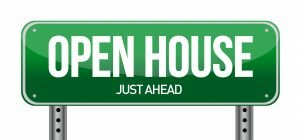The True Purpose of an Open House
Uh-Oh…
“What is the true purpose of an open house? If you said, “To sell my house,” then guess again. The real answer is not what you think—and the truth is one of the best-kept secrets in the real estate business.”
You can imagine this article ruffled a lot of feathers of the real estate community. Prompting outrage from agents like John, wondering why  Realtor.com would ever publish this “secret” with the consumers that subscribe to the site for information—in other words, “This is our secret. It belongs to us. Where is your allegiance?”
Realtor.com would ever publish this “secret” with the consumers that subscribe to the site for information—in other words, “This is our secret. It belongs to us. Where is your allegiance?”
As I write this, in fact, there are 26 pages of comments from outraged Realtors®. I, however, am not one of them. To me, and probably to you, this “dirty little secret” has never been a secret. The sham of the open house is a topic I’ve written about for years. It even occupies a section in my book, in Chapter 6, titled, “Fundamental Mistake #4: if it sounds like hot air and B.S.…”
The author of the article supports this point. “The real reason agents line up to do open houses is: to recruit clients. Open houses are training and recruiting platforms for new agents, or agents who do not yet have listings of their own… Yes, they exist to sell homes, but they also exist to sell brokers… Your house is the agent’s best free marketing platform around.” Obviously this doesn’t come as a surprise to you.
The author continues, “I spent 10 years as a real estate agent in Chicago, and weekend open houses were my rookie agent boot camp.” That sentence, I should point out, is indicative of the typical real estate agent who insists that an open house is a brilliant marketing tool. Most likely, they are just getting started—a rookie—and do not know of any better ways to promote clients’ homes. So, they work to convince homeowners (you) that open houses are a “must use” real estate tool. Even when experienced agents hold open houses, rookies are typically recruited to sit in the open house, because “it,” to them, is more an opportunity to demonstrate (to you) that they’re “working for you,” than to actually sell a home.
I know, hard to believe. But that’s the premise of the article. “It’s understood within the real estate industry that new agents cozy up to more successful listing agents, offering to host their weekly open houses, to pick up buyers.”
Stated differently, experienced agents know better than to waste time on open houses, but rookie agents, have not yet figured this out, so they’re happy to cozy up in your home for a few hours, if it means they could possibly stumble into a prospective client.
As the author of the article points out:
“Real estate websites have replaced them. Most buyers find houses online in the middle of the night, when the kids are asleep, comparing one listing site to the next, clicking through slideshows, and scanning every angle of every photo. Websites, virtual tours, and virtually furnished floor plans are all used to find houses buyers deem worthy of actually visiting. Qualified buyers simply won’t waste time visiting houses they haven’t already checked out online.”
Of course you may ask do open houses have any level of success-rate? The answer is, sure. Occasionally the stars do align. If you’re looking for hard statistics, the author writes:
“The truth is, open houses are a waste of time. Don’t believe me? Ask the National Association of Realtors®, which reported that, in 2014, only 9% of buyers found the home they eventually purchased at an open house. That’s down from 16% in 2004—and the number of buyers who even visited open houses has dropped accordingly, from 51% in 2004 to 44% last year. For the most part, open houses are a relic of the days when access to listings was restricted to those with a real estate license. Open houses were the best way for buyers to peek inside a prospective house without having to make a solid appointment with their agent. Open houses were a way for buyers to see as many properties as possible in one day and get to know a community.
Today’s buyers save viewing properties IRL [in real life] for the fourth step in their buying process, not the first. (The second step is meeting their agent and third is getting pre-approved.) According to NAR, 43% of buyers use the Internet for their initial home search. They get to know the prices, finishes, school districts, and comparable sales before they ever talk to an agent. Thanks to the Internet, today’s buyers are better informed than ever before.”
Here, though, I think is the most important sentence from the author’s article:
“But, please, don’t cry for the dying of the open house. It just means the role of the real estate agent is changing. Homebuyers are smarter, so agents now have to work smarter, too.”
She is right. Homebuyers are smarter.
The problem of course is, many agents refuse to get smarter as well. They’re still peddling the open house as a miracle tool for selling homes. But this isn’t 1999. I’m denying that an open house can’t work. Even a blind squirrel finds a nut every once in awhile. The bigger issue for me though, and this is what upsets me, is the lack of transparency regarding the effectiveness of the open house. Why try to hide the data? Why try to conceal the truth?
If experienced agents actually believed in them, why would they recruit rookie agents to sit in your house all day? So for me, it’s an integrity issue. Exaggerations. White lies. Soon they become outright deceit. I’ve seen it too many times. Further, I’ve have seen the ‘traditional real estate approach’ i.e. open houses, etc. disappoint many of our clients, prior to when they found us.
This is why we’ve taken to studying the World’s greatest investor, Warren Buffett, and his investment philosophy, to develop a unique approach to selling our clients homes. Sounds crazy. But we’ve discovered that by treating your home as an investment, like a business with a “stock”-price—through a Value-driven Approach—a unique way exists to extract up to $30,000 or more of additional profit from any home on the market.
This is, I think, what the author meant by “…so agents must now work smarter, too.”
The first step though, is to conduct a series of tests that heed the information needed to best determine the client’s starting point in the race. The marketplace does not come without competition. Think of these tests as a pre-race diagnosis. If the client’s home is the frontrunner, great! We can run that race. But if the home is determined to be the underdog, no problem, that is fine too. We just need to know. So we can tailor our race strategy in a way that still enables us to win. Plus, as I outline in my book, Chapter 1, Real Estate Greed, we must be certain that the client is protected from it.
If this article provides you one takeaway—the response from John, and the 26 pages of comments, from many other out-raged real estate agents—it is that self-interest is alive and well.
After all, if the consumer were the true priority; you and your best interest is what most concerned agents—to the fact that Realtor.com published this article—why all the hostility? To me, it doesn’t make any sense.

























 ed left but couldn’t see a thing. I knew they were coming. I started to fidget, and my heart beat faster. The sound, much louder now, caused me to lean forward. I rested my hands on my thighs for balance and looked left again. I saw specks in the distance. My heart raced. It pounded in my chest. The blood was pumping through my body. The sound was so loud it was impossible to hear anything else. BEZZZZZZZZZZZZ.
ed left but couldn’t see a thing. I knew they were coming. I started to fidget, and my heart beat faster. The sound, much louder now, caused me to lean forward. I rested my hands on my thighs for balance and looked left again. I saw specks in the distance. My heart raced. It pounded in my chest. The blood was pumping through my body. The sound was so loud it was impossible to hear anything else. BEZZZZZZZZZZZZ. a live just outside of Indianapolis, Indiana. Through the years, they told us so many stories of the Indy 500 Race. They told us how they had been going to the race since they were children and as teenagers they went with friends. I love their stories and sometimes make them repeat some of the funny ones. They had so much fun at the race over the years. It was something they grew up with. A tradition.
a live just outside of Indianapolis, Indiana. Through the years, they told us so many stories of the Indy 500 Race. They told us how they had been going to the race since they were children and as teenagers they went with friends. I love their stories and sometimes make them repeat some of the funny ones. They had so much fun at the race over the years. It was something they grew up with. A tradition. d be missing.
d be missing. 